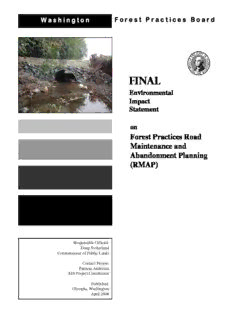
Forest Practices Road Maintenance and Abandonment Planning PDF
Preview Forest Practices Road Maintenance and Abandonment Planning
W a s h i n g t o n F o r e s t P r a c t i c e s B o a r d FINAL Environmental Impact Statement on Forest Practices Road Maintenance and Abandonment Planning (RMAP) Responsible Official: Doug Sutherland Commissioner of Public Lands Contact Person: Patricia Anderson EIS Project Coordinator Published: Olympia, Washington April 2006 This page intentionally left blank Final EIS Fact Sheet This proposal involves amending Title 222 WAC, Forest Practices to limit the burden on small forest landowners from forest road maintenance and abandonment planning requirements and the costs associated with removal of fish passage barriers due to forest roads. Proposed by: Licenses Required: Washington State Forest Practices Board None Lead Agency: Authors and Principal Contributors: Washington State Forest Practices Board DNR Project Coordinator P.O. Box 47012 Patricia Anderson DNR Olympia, WA 98504-7012 Contractor Project Manager Responsible Official: Kate Engel Parametrix Lead Technical Editors Doug Sutherland, Commissioner of Public Kate Engel Parametrix Lands Michael Hall Parametrix Contact Person: Sediment, Hydrology, and Water Quality Patricia Anderson, EIS Project Coordinator Bruce Stoker Earth Systems Department of Natural Resources Fish/Riparian Habitat Forest Practices Board Alan Olson R2 Resource P.O. Box 47012 Consultants Olympia, WA 98504-7012 Wetlands Forest Practices Board Members: Colin Worsley Parametrix Doug Sutherland Board Chair, Wildlife Commissioner of Public Kate Engel Parametrix Lands Michael Hall Parametrix Pat McElroy Alternate Board Chair, GIS/Data Management Department of Natural Margaret Spence Parametrix Resources Jim Glassley Parametrix Sue Mauermann Department of Doretta Collins DNR Community, Trade & Quality Assurance/Quality Control Economic Development Karen Cantillon Parametrix Lee Faulconer Department of Agriculture Gretchen Robinson DNR Tom Laurie Department of Ecology David Whipple Department of Fish & Principal Technical Reviewers Wildlife Jed Herman DNR Doug Stinson general public member, Kathy Murray DNR small forest landowner Gretchen Robinson DNR Sherry Fox general public member, Marc Engel DNR independent logging Darin Cramer DNR contractor Bob Anderson DNR Alan Soicher general public member Venice Goetz DNR Toby Murray general public member Sherri Felix DNR Bob Kelly general public member David Hagiwara general public member Final EIS i Fact Sheet Fact Sheet Date of Issue of FEIS: April, 2006 Proposed Rule Adoption Date: May 10, 2006 Reference Material and Data Located at: Department of Natural Resources Forest Practices Division 1111 Washington Street S.E. P.O. Box 47012 Olympia, WA 98504-7012 Fact Sheet ii Final EIS Distribution List The Environmental Impact Statement was distributed to: FEDERAL AGENCIES USDA Forest Service, U.S. Fish and Wildlife Service, National Marine Fisheries Service, Environmental Protection Agency. STATE AGENCIES Departments of Natural Resources, Ecology, Fish and Wildlife, Community, Trade and Economic Development, Labor and Industries, and Agriculture. STAKEHOLDERS Washington Forest Protection Association, Washington Farm Forestry Association, Washington State Grange, Washington State Farm Bureau, Washington Environmental Council, Audubon Washington, Washington Association of Counties, Northwest Indian Fisheries Commission. INDIAN TRIBES OF WASHINGTON Tribal Chairs and TFW Biologists. PUBLIC LIBRARIES Washington State Library and Depository Libraries. COUNTIES County Commissioners/Executives; County Planners. GENERAL PUBLIC All other individuals and groups on the Forest Practices Board mail lists will receive a notice of availability. The document is available on compact disk and on the Forest Practices Board website at http://www.dnr.wa.gov/forestpractices/rules/activity/. Final EIS iii Distribution List This page intentionally left blank Final EIS Table of Contents FACT SHEET...............................................................................................................i DISTRIBUTION LIST.................................................................................................iii ACRONYM LIST.......................................................................................................vii SUMMARY..............................................................................................................S-1 1. BACKGROUND AND OBJECTIVES.................................................................1-1 1.1 BACKGROUND.......................................................................................................1-1 1.1.1 Forest Practices Rules......................................................................................1-1 1.1.2 Legislative Direction........................................................................................1-2 1.2 PURPOSE AND NEED.............................................................................................1-2 1.2.1 Purpose.............................................................................................................1-2 1.2.2 Need.................................................................................................................1-2 1.3 SCOPING AND THE SIGNIFICANT ISSUES........................................................1-3 1.3.1 Scoping.............................................................................................................1-3 1.3.2 Significant Issues..............................................................................................1-3 1.3.3 Other Issues and Related Documents...............................................................1-4 1.4 DECISION TO BE MADE........................................................................................1-5 2. ALTERNATIVES FOR ANALYSIS....................................................................2-1 2.1 ALTERNATIVES CONSIDERED BUT ELIMINATED FROM DETAILED STUDY..............................................................................................2-1 2.2 ALTERNATIVES CONSIDERED IN DETAIL.......................................................2-1 2.2.1 Alternative 1 (2001 Rules)...............................................................................2-2 2.2.2 Alternative 2 (Rules to Implement SSHB 1095)..............................................2-2 2.2.3 Alternative 3 (Rules to Implement SSHB 1095 Plus Clarifications)...............2-3 2.3 ALTERNATIVE COMPARISON.............................................................................2-3 3. AFFECTED ENVIRONMENT AND ENVIRONMENTAL EFFECTS..................3-1 3.1 INTRODUCTION.....................................................................................................3-1 3.1.1 Available Data..................................................................................................3-2 3.1.2 Analysis Approach...........................................................................................3-3 3.2 WATER RESOURCES.............................................................................................3-9 3.2.1 Introduction......................................................................................................3-9 3.2.2 Affected Environment......................................................................................3-9 3.2.3 Environmental Effects....................................................................................3-14 3.3 RIPARIAN HABITAT............................................................................................3-19 3.3.1 Introduction....................................................................................................3-19 3.3.2 Affected Environment....................................................................................3-19 3.3.3 Environmental Effects....................................................................................3-21 3.4 WETLANDS...........................................................................................................3-25 3.4.1 Introduction....................................................................................................3-25 3.4.2 Affected Environment....................................................................................3-25 3.4.3 Environmental Effects....................................................................................3-27 3.5 FISH.........................................................................................................................3-31 3.5.1 Introduction....................................................................................................3-31 3.5.2 Affected Environment....................................................................................3-31 3.5.3 Environmental Effects....................................................................................3-34 Final EIS v Table of Contents Table of Contents 3.6 WILDLIFE...............................................................................................................3-37 3.6.1 Introduction....................................................................................................3-37 3.6.2 Affected Environment....................................................................................3-37 3.6.3 Environmental Effects....................................................................................3-37 3.7 CUMULATIVE EFFECTS.....................................................................................3-41 3.7.1 Water Resources.............................................................................................3-41 3.7.2 Riparian Areas and Fish.................................................................................3-41 3.7.3 Wetlands.........................................................................................................3-42 3.7.4 Wildlife...........................................................................................................3-42 4. LITERATURE CITED.........................................................................................4-1 5. GLOSSARY.......................................................................................................5-1 APPENDICES A PROPOSED RMAP RULE IMPLEMENTING SSHB 1095 B LARGE FOREST LANDOWNER RMAP C SMALL FOREST LANDOWNER CHECKLIST ROAD MAINTENANCE AND ABANDONMENT PLAN (RMAP) D GIS DATA AND METHODOLOGY E COMMENT LETTERS REGARDING THE DRAFT EIS F SUMMARIES OF AND RESPONSES TO COMMENTS ON THE DRAFT EIS LIST OF FIGURES 2-1 Alternative Pathways to Development of RMAPs for Various Landowner Classes Defined under the Proposed Alternatives................................................2-8 2-2 Alternative Pathways to Repairing Fish Passage Barriers for Various Landowner Classes Defined under the Proposed Alternatives.............................2-9 LIST OF TABLES 2-1. Summary and Comparison of the Environmental Effects of the Proposed Alternatives..........................................................................................................2-4 2-2. Criteria for Selection of the Preferred Alternative...............................................2-7 3.1-1. Acreage of the Four Sample Counties on which RMAPs, Checklist RMAPs, or No RMAPs Would Be Required for Private Forest Landowners, under Each Alternative...................................................................................................3-5 3.2-1. Washington State Water Quality Standards for Sediment-related Parameters...3-11 3.2-2. Miles of Road on Private Parcels for which RMAPs, Checklist RMAPs, or No RMAPs Would Be Required in the Four Sample Counties under Each Alternative..........................................................................................................3-13 3.2-3. Areas (Acres) of Low-, Medium-, and High-probability of Slope Instability on Private Parcels for which RMAPs, Checklist RMAPs, or No RMAPs Would Be Required in the Three Westside Sample Counties under Each Alternative..........................................................................................................3-15 3.4-1. Wetland Area (acres) on Private Parcels for which RMAPs Checklist RMAPs or No RMAPs Would Be Required under Each Alternative................3-29 Table of Contents vi Final EIS
Description: